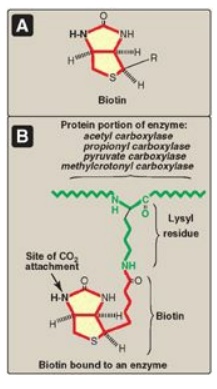Biotin
| Home | | Biochemistry |Chapter: Biochemistry : Vitamins
Biotin is a coenzyme in carboxylation reactions, in which it serves as a carrier of activated carbon dioxide.
BIOTIN
Biotin is a coenzyme in
carboxylation reactions, in which it serves as a carrier of activated carbon
dioxide (see Figure 10.3 for the mechanism of biotin-dependent carboxylations).
Biotin is covalently bound to the ε-amino group of lysine residues in
biotin-dependent enzymes (Figure 28.16). Biotin deficiency does not occur
naturally because the vitamin is widely distributed in food. Also, a large
percentage of the biotin requirement in humans is supplied by intestinal
bacteria. However, the addition of raw egg white to the diet as a source of
protein induces symptoms of biotin deficiency, namely, dermatitis, glossitis,
loss of appetite, and nausea. Raw egg white contains a glycoprotein, avidin,
which tightly binds biotin and prevents its absorption from the intestine. With
a normal diet, however, it has been estimated that 20 eggs/day would be
required to induce a deficiency syndrome. Thus, inclusion of an occasional raw
egg in the diet does not lead to biotin deficiency, although eating raw eggs is
generally not recommended due to the possibility of salmonella infection.
Multiple carboxylase deficiency results from a
defect in the ability to add biotin to carboxylases during their synthesis or
to remove it from carboxylases during their degradation. Treatment is biotin
supplementation.

Figure 28.16 A. Structure of
biotin. B. Biotin covalently bound to a lysyl residue of a biotin-dependent
enzyme.
